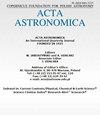Superspinning Quark Stars Limited by Twin High-FrequencyQuasiperiodic Oscillations
IF 2
4区 物理与天体物理
Q2 ASTRONOMY & ASTROPHYSICS
引用次数: 3
Abstract
We study properties of Keplerian disks and their high-frequency quasi-periodic oscillations (HF QPOs) in the field of quark stars with dimensionless spin a breaking the black-hole spin limit of a = 1 up to a approximate to 1.3. Using the external geometry of the superspinning quark stars approximated by the Kerr geometry, we show that the Keplerian disks have to touch the surface of such quark stars and their accretion efficiency eta approximate to 18% significantly exceeds the efficiency related to the Schwarzschild black holes. Using the geodesic oscillation models, we test possible existence of the superspinning quark stars in atoll sources demonstrating the twin HF QPOs with resonant frequency ratios 3:2, 4:3, 5:4. For explanation of the twin HF QPOs we consider the standard relativistic precession model and its modifications, the tidal distortion model, the resonance epicyclic and the warped disk model. In a given model, we assume occurrence of the twin oscillatory modes at a common resonant dimensionless radius x = r/M determined by the frequency ratio and the quark star spin a. The theoretical limit R > 3M on the quark star surface radius puts strong restrictions on the relations between the resonant radii x and the quark star spin a. These restrictions imply that all the considered geodesic oscillation models can be excluded, except for one variant of the relativistic precession model, or alternatively the tidal distortion and warped disk models, that allow for appearance of the twin HF QPOs with frequency ratio 3 : 2 at radii slightly above the theoretical limit on the radius of the quark star surface, but exclude the smaller frequency ratios (4:3, 5:4).受双高频准周期振荡限制的超自旋夸克星
我们研究了开普勒圆盘的性质及其在具有无量纲自旋a的夸克星场中的高频准周期振荡(HF-QPO),打破了黑洞自旋极限a=1,达到约1.3。利用Kerr几何近似的超自旋夸克星的外几何方法,我们发现开普勒圆盘必须接触这种夸克星表面,其吸积效率η接近18%,大大超过了与Schwarzschild黑洞有关的效率。使用测地振荡模型,我们测试了环礁源中超旋夸克星的可能存在,证明了三种HF QPO的共振频率比为3:2、4:3、5:4。在解释双HF QPO之前,我们考虑了标准相对论进动模型及其修正、潮汐阻尼模型、共振周转和翘曲盘模型。在给定的模型中,我们假设在由频率比和夸克星自旋确定的共同共振无量纲半径x=r/M处出现双振荡模式。夸克星表面的理论极限R>3M对共振半径x和夸克星自旋a之间的关系提出了强有力的限制。这些限制意味着,除了相对进动模型的一个变体,或者潮汐畸变和翘曲盘模型之外,所有考虑的测地振荡模型都可以被排除,允许在略高于夸克星表面半径理论极限的半径处出现频率比为3∶2的双HFQPO,但不包括较小的频率比(4∶3,5∶4)。
本文章由计算机程序翻译,如有差异,请以英文原文为准。
求助全文
约1分钟内获得全文
求助全文
来源期刊

Acta Astronomica
地学天文-天文与天体物理
CiteScore
3.40
自引率
4.50%
发文量
0
审稿时长
>12 weeks
期刊介绍:
Information not localized
 求助内容:
求助内容: 应助结果提醒方式:
应助结果提醒方式:


